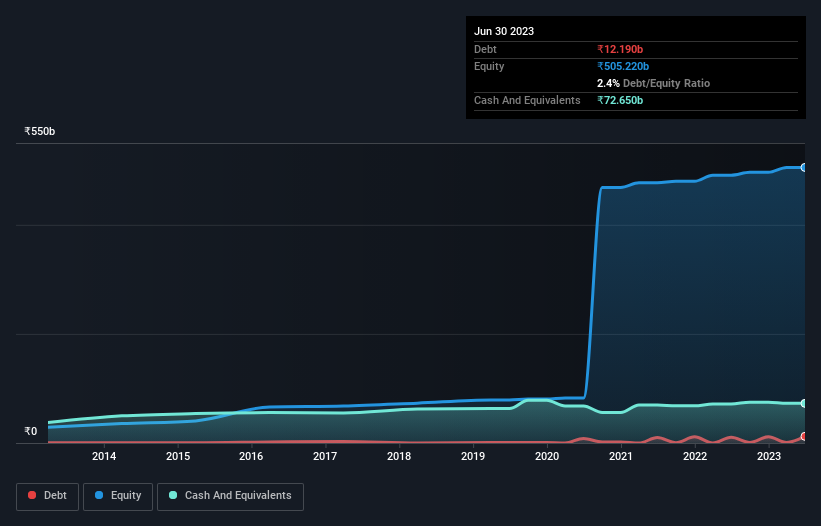
Some say volatility, rather than debt, is the best way to think about risk as an investor, but Warren Buffett famously said that 'Volatility is far from synonymous with risk.' When we think about how risky a company is, we always like to look at its use of debt, since debt overload can lead to ruin. We note that Hindustan Unilever Limited (NSE:HINDUNILVR) does have debt on its balance sheet. But the more important question is: how much risk is that debt creating?
What Risk Does Debt Bring?
Debt and other liabilities become risky for a business when it cannot easily fulfill those obligations, either with free cash flow or by raising capital at an attractive price. Part and parcel of capitalism is the process of 'creative destruction' where failed businesses are mercilessly liquidated by their bankers. However, a more usual (but still expensive) situation is where a company must dilute shareholders at a cheap share price simply to get debt under control. Having said that, the most common situation is where a company manages its debt reasonably well - and to its own advantage. When we examine debt levels, we first consider both cash and debt levels, together.
See our latest analysis for Hindustan Unilever
What Is Hindustan Unilever's Net Debt?
You can click the graphic below for the historical numbers, but it shows that as of March 2023 Hindustan Unilever had ₹12.2b of debt, an increase on ₹10.4b, over one year. However, it does have ₹72.7b in cash offsetting this, leading to net cash of ₹60.5b.

A Look At Hindustan Unilever's Liabilities
The latest balance sheet data shows that Hindustan Unilever had liabilities of ₹120.3b due within a year, and liabilities of ₹105.4b falling due after that. Offsetting these obligations, it had cash of ₹72.7b as well as receivables valued at ₹38.7b due within 12 months. So its liabilities outweigh the sum of its cash and (near-term) receivables by ₹114.4b.
This state of affairs indicates that Hindustan Unilever's balance sheet looks quite solid, as its total liabilities are just about equal to its liquid assets. So it's very unlikely that the ₹5.84t company is short on cash, but still worth keeping an eye on the balance sheet. While it does have liabilities worth noting, Hindustan Unilever also has more cash than debt, so we're pretty confident it can manage its debt safely.
Fortunately, Hindustan Unilever grew its EBIT by 8.5% in the last year, making that debt load look even more manageable. When analysing debt levels, the balance sheet is the obvious place to start. But ultimately the future profitability of the business will decide if Hindustan Unilever can strengthen its balance sheet over time. So if you're focused on the future you can check out this free report showing analyst profit forecasts.
Finally, while the tax-man may adore accounting profits, lenders only accept cold hard cash. Hindustan Unilever may have net cash on the balance sheet, but it is still interesting to look at how well the business converts its earnings before interest and tax (EBIT) to free cash flow, because that will influence both its need for, and its capacity to manage debt. Over the most recent three years, Hindustan Unilever recorded free cash flow worth 66% of its EBIT, which is around normal, given free cash flow excludes interest and tax. This cold hard cash means it can reduce its debt when it wants to.
Summing Up
While it is always sensible to look at a company's total liabilities, it is very reassuring that Hindustan Unilever has ₹60.5b in net cash. So we don't think Hindustan Unilever's use of debt is risky. When analysing debt levels, the balance sheet is the obvious place to start. But ultimately, every company can contain risks that exist outside of the balance sheet. Be aware that Hindustan Unilever is showing 1 warning sign in our investment analysis , you should know about...
Of course, if you're the type of investor who prefers buying stocks without the burden of debt, then don't hesitate to discover our exclusive list of net cash growth stocks, today.
Valuation is complex, but we're here to simplify it.
Discover if Hindustan Unilever might be undervalued or overvalued with our detailed analysis, featuring fair value estimates, potential risks, dividends, insider trades, and its financial condition.
Access Free AnalysisHave feedback on this article? Concerned about the content? Get in touch with us directly. Alternatively, email editorial-team (at) simplywallst.com.
This article by Simply Wall St is general in nature. We provide commentary based on historical data and analyst forecasts only using an unbiased methodology and our articles are not intended to be financial advice. It does not constitute a recommendation to buy or sell any stock, and does not take account of your objectives, or your financial situation. We aim to bring you long-term focused analysis driven by fundamental data. Note that our analysis may not factor in the latest price-sensitive company announcements or qualitative material. Simply Wall St has no position in any stocks mentioned.
About NSEI:HINDUNILVR
Hindustan Unilever
A fast-moving consumer good company, manufactures and sells food, home care, personal care, and refreshment products in India and internationally.
Flawless balance sheet average dividend payer.

